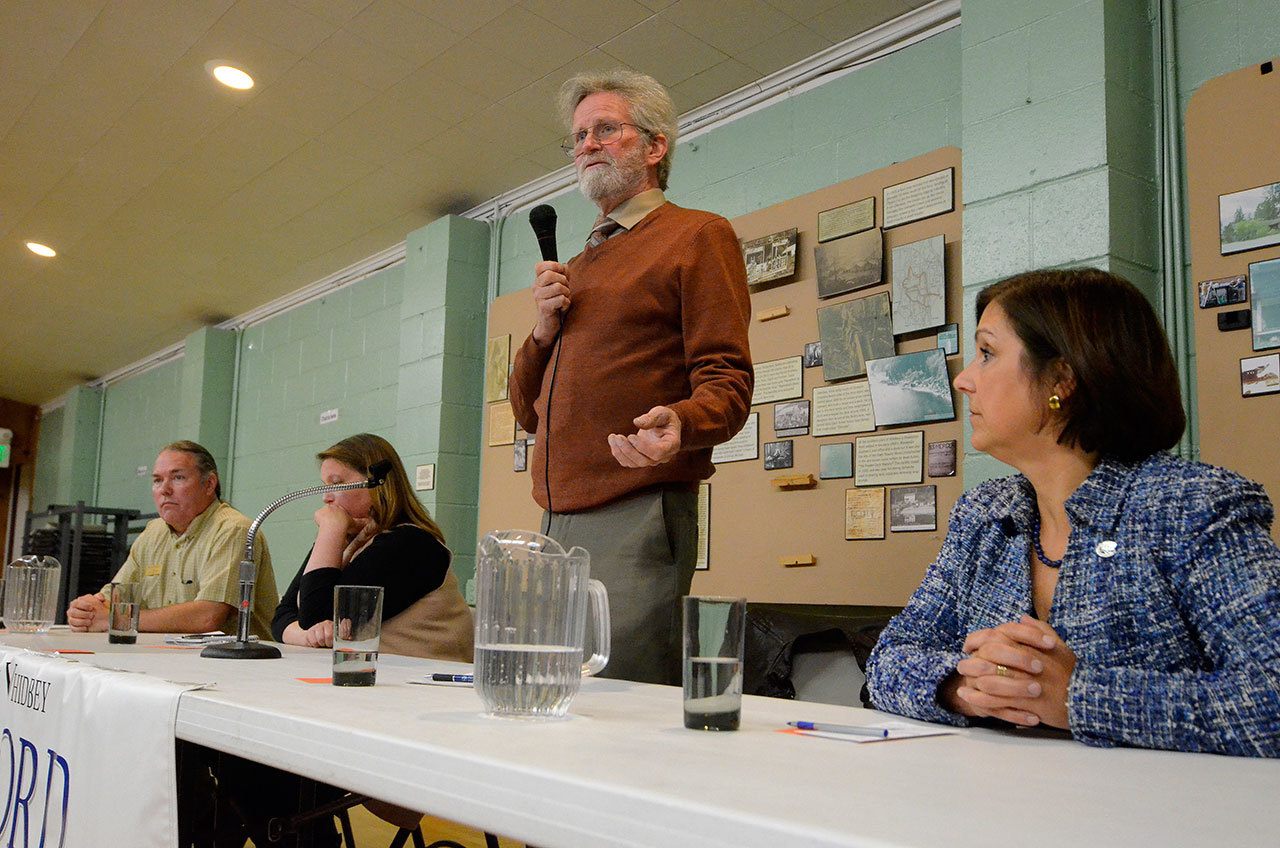Some questions are just off limits, several Whidbey commissioner hopefuls decided at a election forum in Clinton on Monday.
That includes who they’ll be supporting for president.
“None of your damn business, Steve,” said incumbent district 2 county Commissioner Jill Johnson, an Oak Harbor Republican.
Whidbey Environmental Action Network’s Steve Erickson asked the question, characterizing it as the “elephant in the room.” Only one of the four candidates at the forum revealed who would get their vote.
Monday’s voter forum, organized by the South Whidbey Record and Clinton Progressive Association, featured candidates vying for the two open county commissioner seats. Incumbent Helen Price Johnson, a Clinton Democrat, and Gary Wray, a Coupeville Republican, are currently vying for the district 1 seat. Johnson and her challenger John Fowkes, an Oak Harbor Democrat, are facing off for the district 2 seat.
Price Johnson firmly said she will be voting for Hillary Clinton, while Fowkes said he was leaning towards voting for Clinton but is still undecided. Wray declined to say who he will get his vote come November but made it crystal clear who would not — Hillary Clinton.
“She has pushed risk for our national security, and I will not vote for Hillary Clinton,” Wray said. “But that doesn’t show who I will vote for, since there are four candidates on the ballot.”
The dominant topic of the evening concerned the affordable housing crisis in Island County and how the commissioners will solve it if elected. Some questions asked by the moderator — which covered topics such as the county’s opioid crisis, homelessness and the aging demographic in the county — reverted back to affordable housing as the first step to fixing these problems.
“Affordable housing is not a problem anymore, it’s a crisis,” Fowkes said.
All candidates highlighted the issue as a central talking point, with Fowkes and Wray saying it’s one of the main reasons they are running for office. Price Johnson said sewer infrastructure is what will drive affordable housing and allow multi-family units in Freeland. She pointed to efforts made by the city of Langley to change its zoning to allow more multi-family units as a positive step in the right direction.
Johnson pointed to a task force she organized to tackle the issue; she’s hopeful it will make a dent in the issue. Wray said he’s passionate about affordable housing, but criticized the Growth Management Act, which he said requires higher densities where there isn’t population growth. He supported what he called creative solutions to the issue, which included clustering homes in places that have the infrastructure to allow it. He does not, however, believe county government should pick up the whole tab for such investments, such as the current bid in Freeland for sewers.
Price Johnson said she has hopes the state will help fill the $5 million funding gap in the project, but that if those efforts fail she’ll bring up the issue again.
“I’m grateful we have heard from Senator Bailey that this is her number one capitol ask in the legislative session, and I’ll do what I can to get it across the finish line,” Price Johnson said. “If it doesn’t pass, I will be back again.”
Another hot topic of discussion was the low property tax rate and if it’s time to raise rates due to the county’s limited services. The question saw split opinions. Price Johnson referred to cuts in county law and justice positions during the recession as an area that needs to be addressed, saying “if there is a targeted need in the community, it’s time to put it on the ballot.” Fowkes said he doesn’t like the idea of increased taxes, but is for organizing a task force to find out what the community wants, while Wray similarly said he would listen to citizens if there was a strong preference toward raising rates.
Johnson voiced firm opposition to raising the property tax rate unless there is a specific need.
“I would never support a levy effort,” she said. “I think there are times when asking is necessary but it has to be specific — I’m not in favor of a big ambiguous approach.”
She added that rural living comes with a price.
“Some of the big city services people expect when they move here, we don’t offer,” Johnson said. “That’s the difference between rural and urban. People who want services haven’t been islanders long.”
Other topics of discussion included the county’s heroin crisis and a possible new 144-car ferry to the Mukilteo-Clinton route. The candidates were in agreement that opioid use is reaching crisis levels, and all said the county needs to change its approach to dealing with the issue. The candidates all said increased local services should be a priority, and the incumbents pointed to current efforts to reach out to addicts as a step in the right direction.
All candidates highlighted the need for a new ferry for the Mukilteo-Clinton route, the busiest in the state ferries system. They similarly mentioned building and maintaining relationships with politicians and bureaucrats in Olympia as key to adding another ferry to alleviate ferry congestion.



